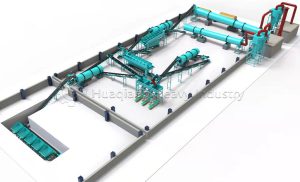In the wave of green agricultural development, organic fertilizer production lines are undoubtedly the core force driving the reduction of chemical fertilizer use and the improvement of soil quality. But did you know? An efficient organic fertilizer production line requires more than just a single piece of equipment. The coordinated efforts of various supporting fertilizer equipment truly make the miracle of “turning waste into gold” a reality.
Take the pretreatment stage, for example. Livestock and poultry manure dehydrators are undeniable pioneers. They can quickly dehydrate fresh manure with a moisture content exceeding 80% to approximately 50%, significantly reducing the subsequent fermentation volume and preventing mold and harmful gases from forming.Following closely behind, the organic fertilizer compost turner acts like a tireless “massager.” By regularly turning the compost to allow the fermented material to fully experience air, it shortens the fermentation cycle from the traditional three months to 20 days, and increases the organic matter content of the finished product by over 15%.
Entering the advanced processing stage, the organic fertilizer granulator is a “shaping master.” Whether it’s round spheres or uniform columns, it precisely controls particle size, ensuring the fertilizer is not only aesthetically pleasing and easy to store, but also achieves a slow-release effect. The drum screener machine acts as a “quality inspector,” screening out unqualified large particles for secondary processing, ensuring that every bag of organic fertilizer leaving the factory meets international standards.Finally, an automatic packaging machine weighs and seals bags at a rate of 15 bags per minute, allowing the product to quickly enter the global market.
Today, more and more farms and fertilizer companies are realizing that a complete organic fertilizer production system is both environmentally responsible and an investment in sustainable agricultural development. When these devices work together seamlessly, they not only process agricultural waste and reduce non-point source pollution, but also infuse “vitality” into the soil, bringing every inch of land to life.



